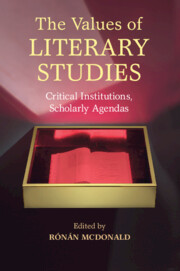Book contents
- Frontmatter
- Contents
- Notes on Contributors
- Acknowledgments
- Introduction
- 1 The Value of Criticism and the Project of Modernism
- 2 Caprice: Individual Subjectivity in Literary Criticism
- 3 The Phenomenology of Literary Valuation
- 4 Literature Is History: Aesthetic Time and the Ethics of Literary Will
- 5 Dead on Arrival: Time and the Value of Old Books
- 6 The Price of Value
- 7 To Shelter the Nothing That Happens
- 8 When Literary Criticism Mattered
- 9 Literature among the Objects of Modernist Criticism: Value, Medium, Genre
- 10 “Vale!” : Psychoanalysis, Value, and Literature
- 11 Afterlives of Comparison: Literature, Equivalence, Value
- 12 Feminism, Gender, and the Literary Commons
- 13 The Value of World Making in Global Literary Studies
- 14 Multiple Versions and Fictional Minds: Manuscript Research, Digital Editing, and Enactive Cognition in Literary Studies
- 15 After Suspicion: Surface, Method, Value
- 16 Literary Experience and the Value of Criticism
- Index
8 - When Literary Criticism Mattered
Published online by Cambridge University Press: 05 November 2015
- Frontmatter
- Contents
- Notes on Contributors
- Acknowledgments
- Introduction
- 1 The Value of Criticism and the Project of Modernism
- 2 Caprice: Individual Subjectivity in Literary Criticism
- 3 The Phenomenology of Literary Valuation
- 4 Literature Is History: Aesthetic Time and the Ethics of Literary Will
- 5 Dead on Arrival: Time and the Value of Old Books
- 6 The Price of Value
- 7 To Shelter the Nothing That Happens
- 8 When Literary Criticism Mattered
- 9 Literature among the Objects of Modernist Criticism: Value, Medium, Genre
- 10 “Vale!” : Psychoanalysis, Value, and Literature
- 11 Afterlives of Comparison: Literature, Equivalence, Value
- 12 Feminism, Gender, and the Literary Commons
- 13 The Value of World Making in Global Literary Studies
- 14 Multiple Versions and Fictional Minds: Manuscript Research, Digital Editing, and Enactive Cognition in Literary Studies
- 15 After Suspicion: Surface, Method, Value
- 16 Literary Experience and the Value of Criticism
- Index
Summary
I
To think about the study of literature as possessing “values” is, I think, already to skew things. In the Anglophone tradition, something has “value” if it can be measured in external units. Adam Smith famously argued that a value of a thing is measured either in terms of what might be substituted for it (its exchange value) or in terms of its quantifiable utilities (its use value). In this framework, value is primarily an economic concept, but, at least from Jeremy Bentham on, it has also been a governmental one. Although earlier philosophers like John Locke or David Hume did not deploy the term, Bentham introduced it precisely to advise those he calls “legislators” on how to manage a population's happiness. As such, it quickly came under attack: “Worth was degraded into a lazy synonyme of value; and value was exclusively attached to the interests of the senses” as Samuel Coleridge put it.
Today we have another sense of value too. It appears in “values of” sentences like “The University is committed to the values of diversity and transparency.” This “values of” phrasing is philosophically rooted in Nietzsche's “transvaluation of all values” (Umwertung alles Werte) in which value became not a measure but a predicate. In “values of” discourse, “value” refers to criteria for judgment and action that are, however, expressive. “Values of” discourse also recognizes that values differ: it is pluralist as well as expressivist. But just as literary studies stands outside the conceptual framework in which things are ascribed “value,” they do not, at least in one core lineage, quite have “values” either.
Indeed, from its beginning, a core strand of literary studies – which I will call “modern literary criticism” – sought to find standards without appealing either to value in the singular, to expressive values in the plural, or indeed to “worth,” or substantive qualities like right, good, or beauty. It turned rather to the literary heritage. It was committed to immanence: to finding what had worth in the heritage just as a result of comparative acts of attention to works in that heritage, as if to make judgments inductively on grounds supplied by the heritage.
- Type
- Chapter
- Information
- The Values of Literary StudiesCritical Institutions, Scholarly Agendas, pp. 120 - 136Publisher: Cambridge University PressPrint publication year: 2015
- 2
- Cited by



